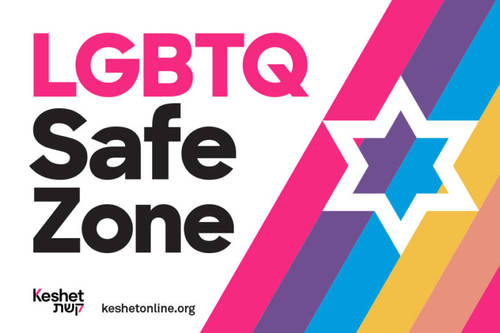Conversions
The Journey to Joining the Jewish People
A Road Map for Conversion Students
Becoming Jewish is a deeply personal journey. Only you can determine the point at which you feel ready to begin and end your journey to Judaism, which culminates in a meeting with a Beit Din (a rabbinic court) and immersion in a mikveh. (For men, conversion also requires b’rit milah (ritual circumcision) or, for those already circumcised, hatafat dam b’rit (symbolic ritual circumcision), which you can learn more about here. These rituals must be performed before Beit Din/Mikveh. You will know you’re ready when you can answer “yes” to the following questions without hesitation.
Can you answer YES to these questions?
- Do you, of your own free will, choose to enter into the covenant between God and the people Israel, and to become a Jew?
- Do you accept Judaism to the exclusion of all other religious faiths and practices?
- Do you pledge your loyalty to the Jewish people under all circumstances?
- Do you commit yourself to the pursuit of Torah and Jewish learning?
- Do you promise to establish a Jewish home, and to participate in the life of the Jewish people?
- If you are blessed with children, do you promise to rear them as Jews?
Getting to the place where you can confidently and affirmatively answer those questions requires work and self-direction on your part, determining for yourself what you need to learn and what experiences you need to have. While there is no set timeline for this, you should expect your journey to take at least 6 months.
The rabbi’s or cantor’s role is to guide your self-direction: getting you started, answering your questions, helping you clarify your path, challenging you to go deeper.
While there is no fee to pursue conversion; donations to the Temple Fund are always welcome.
Getting Started
Required Reading
1.) A Short History of the Jewish People by Raymond Scheindlin
2.) To Life! by Harold Kushner
3.) Teach Yourself to Read Hebrew by Ethelyn Simon and Joseph Anderson
You should do this reading at your own pace, noting your questions or observations that emerge from the material. These observations will typically form the basis of your discussions with the rabbi/cantor.
Optional Reading
1.) Choosing a Jewish Life by Anita Diamant
2.) The Observant Life: The Wisdom of Conservative Judaism… Edited by Martin S. Cohen, et. al.
"Learn to Read Hebrew" videos by the Miller Introduction to Judaism Program
Formal learning is but one component of a fully integrated Jewish education. For the student intending to join the Jewish people, formal education is enriched with reading and study at home and a broad range of Jewish experiences outside the classroom. After all, Judaism is not an idea, but rather a living people; it offers involvement, belonging, and experiencing. Jewish identity and community is sustained and deepened throughout one's life.
It is in this spirit that those students seeking to become part of the Jewish people work on the following areas of believing, behaving, and belonging Jewishly.
► Regular synagogue attendance – A living, embodied Jewish life involves attending and participating in Jewish communal worship, and a personal commitment to living and growing Jewishly within the context of a caring synagogue community in which you feel comfortable, welcomed, and nourished. It is in that context that you can cultivate a relationship with God, the Jewish tradition, and the Jewish people through encountering Jewish prayer.
► Integrating into the rhythm and observance of the Jewish calendar - A rich Jewish life involves experience with traditional Shabbat observance. You are invited to become at home with celebrating Shabbat through making Shabbat a time for abstaining from weekday activities like working, using technology, spending money, and cooking. Additionally, you are invited to gain comfort with the Shabbat home rituals, attending communal worship, and devoting the day to prayer, song, study, spending time with family, and resting. Similarly, you are encouraged to grow in observing the Jewish holidays through performing home rituals, attending communal worship, abstaining from weekday activities, and practicing the particular rituals/customs/practices associated with those holy days, festivals, and celebrations. Finally, Judaism bids you to continue growing in your observance and deepening your relationship to God, Torah, and Israel through observance.
► Incorporating Jewish observance into your daily life – We invite you to deepen your participation in kashrut (the Jewish food laws) for a substantial period of time, incorporating the laws of kashrut into your diet. Additionally, you are encouraged to express your gratitude and core values through Jewish prayer and blessings as a daily routine. Most urgently, you can continue to refine your moral code with the ideals of the Jewish ethical tradition and to live a more socially conscious life because of a sense of Jewish connection. This may include (but is not limited to) contributing to tzedakah (charity), working to advance the cause of tikkun olam (repairing the world through promoting social justice and peace), and performing gemillut hasadim (acts of personal kindness to others).
► Cultivating a Jewish cultural identity - You are encouraged to experience (and cultivate a love for) Jewish bookstores, Judaica shops, kosher markets and kosher bakeries; eating at kosher restaurants; attending Jewish and Israeli cultural events; participating in political events relevant to Jewish or Israeli concerns; enjoying Jewish and Israeli visual, performance, and film art; reading Jewish and Israeli literature; and visiting Jewish museums. We hope this will help you grow in your sense of Jewish cultural identity.
► Continuing your spiritual growth through Jewish Learning - You are invited to experience (and continue to cultivate a love for) Judaic learning outside the context of the Introduction to Judaism course. We hope you are inspired to grow Jewishly through a continued, committed pursuit of Judaic learning - at a synagogue, through the AJU’s Whizin Department of Continuing Education and other venues.
► Choosing a Jewish Name – Selecting a Jewish name is an affirmation of one’s Jewish identity and is an important aspect of Jewish believing, behaving, and belonging. In this sense, we invite you to select a Hebrew name that resonates with you. The name can be similar in sound and/or in meaning to your non-Jewish name, a Hebrew version of the name of an ancestor, or a name expressing your hopes and dreams for your life as a Jew. For reference, see The Comprehensive Dictionary of English & Hebrew First Names by Alfred J. Kolatch, The New Jewish Baby Book by Anita Diamant, The Complete Book of Hebrew Baby Names by Smadar Shir Sidi, or other books on the subject.
► Building a noticeably Jewish Home - Please continue building a Jewish home library* and a collection of Jewish ritual objects to bring Jewish learning, practice, and observance into your home and life. In addition to the books required as part of the course reading, it will be enriching to acquire:
- Siddur (We recommend Siddur Sim Shalom or Lev Shalem)
- Humash with a commentary (We recommend the Etz Hayyim Humash)
- Tanakh (We recommend Tanakh by the Jewish Publication Society)}
- A Kipah (or several)
- Shabbat candles/candlesticks
- Havdallah Set
- Mezuzah
Work on building your home library and Judaica collection with the books on the suggested reading list as well as the following ritual items:
- Tallit
- Tefillin
- Kiddush cup
- Passover Seder plate
- Passover Haggadah
- Challah Cover
- Hanukkiyah
Those students intending to convert will also be asked to:
► Meet regularly with the Clergy. A sustained relationship with the rabbi is essential for your journey into Judaism. Meeting with the rabbi aims at encouraging you to foster a sustained relationship with the rabbi and to empower the rabbi to provide personal guidance and support for you. In these meetings, you and the rabbi will discuss your Jewish journey, supplement your learning, and explore what steps will be necessary for you before you are ready to appear before a Beit Din for conversion. You should set up these appointments as far in advance as possible, and can do so by contacting Rabbi Rachel Salston.
► Keep a “Jewish Growth Journal”. Becoming part of the Jewish people is a beautiful journey, but it can also be challenging – intellectually, spiritually, emotionally, and even physically. Because of this, we ask you to keep a “Jewish Growth Journal,” which will be a combination of free-form reflection and guided exercises. Please journal at least twice a month while you are in the Program (approximately nine entries). Some of these entries will be about topics specifically assigned by your instructor (i.e., reflections on synagogue experiences, observing Shabbat, keeping kosher, etc.), and the rest will be left to your discretion – we would especially love to share your personal reactions to your Jewish learning and experiences.
You will be expected to share your Jewish Growth Journal with your instructor and your sponsoring rabbi, and your instructor and sponsoring rabbi will provide you with feedback and advice based on your reflections. You can opt to do your journal in a traditional pen-and-paper format, to type it using a computer, or to keep a private online journal (accessible only to you, your instructor, and your sponsoring rabbi). Once you feel ready to formalize your entry into the Jewish people, please schedule an appointment with the rabbi. You and the rabbi will discuss your readiness to appear before the Beit Din. When you and the rabbi agree that you are ready, feel free to call Norma in the synagogue office to make an appointment for your conversion (conversion ceremonies commonly last from 60 to 90 minutes, and include a meeting with the Beit Din and immersion in the Mikveh). Men converting to Judaism will be asked to arrange to have a b’rit milah (ritual circumcision) or, when applicable, a hatafat dam b’rit (taking a drop of blood from the site of the circumcision) before they appear before the Beit Din.
Suggested Reading List
As mentioned above, it is our opinion that no Jewish home would be complete without the following books on the bookshelf:
- A Siddur (We recommend Siddur Sim Shalom or Lev Shalem)
- A Humash with a commentary (We recommend the Etz Hayyim Humash)
- A Tanakh (We recommend Tanakh by the Jewish Publication Society)
Additionally, students exploring Judaism are often interested in a variety of related topics. The following list is certainly not exhaustive, but is a good place to begin. If you’d like further suggestions, please give us a call. We’ll be happy to give you ideas based on your interests.
Jewish History
Shaye Cohen, From the Maccabees to the Mishnah
Abba Eban, My People: The Story of the Jews
David Klinghoffer, Why the Jews Rejected Jesus
Israel
Peter Beinart, The Crisis of Zionism
Alan Dershowitz, The Case for Israel
Yossi Klein Halevi, Like Dreamers
Walter Herzberg, The Zionist Idea
Benny Morris, Righteous Victims
Ari Shavit, My Promised Land
Conservative Judaism
Martin S. Cohen, The Observant Life: The Wisdom of Conservative Judaism…
Elliot Dorff, Conservative Judaism: Our Ancestors to Our Descendents
Elliot Dorff, For the Love of God and People
Neil Gillman, Conservative Judaism: The New Century
Robert Gordis, Understanding Conservative Judaism
God, Theology, and Spirituality
Elliot Dorff, Knowing God: Jewish Journeys to the Unknowable
Neil Gillman, Sacred Fragments: Recovering Theology for the Modern Jew
Arthur Green, Seek My Face
Abraham Joshua Heschel, God in Search of Man
Harold Kushner, When Bad Things Happen to Good People
Harold Schulweis, For Those Who Can’t Believe
Joseph Soloveitchik, The Lonely Man of Faith
Jewish Practice and Values
Bradley Shavit Artson, It’s A Mitzvah! Step-By-Step to Jewish Living
Elliot Dorff, Love Your Neighbor and Yourself
Elliot Dorff, Matters of Life and Death
Elliot Dorff, The Way into Tikkun Olam
Elliot Dorff, Jewish Choices, Jewish Voices: Social Justice
Samuel Dresser and Seymour Seigel, The Dietary Laws
Isaac Klein, Guide to Jewish Religious Practice
Alfred Kotlach, The Jewish Home Advisor
Kerry Olitzky, The Complete How-To Handbook for Jewish Living
Shabbat and Holidays
Abraham Joshua Heschel, The Sabbath
Michael Strassfeld, The Jewish Holidays
Ron Wolfson, Shabbat: The Family Guide to Preparing for and Welcoming the
Sabbath
Ron Wolfson, Hanukkah, 2nd Edition: The Family Guide to Spiritual Celebration
Noam Zion and Shawn Fields-Meyer, A Day Apart: Shabbat at Home
Jewish Prayer
Mike Comins, Making Prayer Real
Hayim HaLevy Donin, To Pray As A Jew
Abraham Joshua Heschel, Man’s Quest for God
Stephen R. Schach, The Structure of the Siddur
Zalman Schachter-Shalomi, Davening: A Guide to Meaningful Jewish Prayer
Studying Sacred Text
Bradley Shavit Artson, The Bedside Torah
Marc Zvi Brettler, How to Read the Jewish Bible
Judith Hauptman, Rereading the Rabbis: A Woman’s Voice
Barry Holtz, ed., Back to the Sources: Reading the Classic Jewish Texts
Michael Katz and Gershon Schwartz, Swimming in the Sea of Talmud
Michael Katz and Gershon Schwartz, Searching for Meaning in Midrash
James L. Kugel, How to Read the Bible
Nechama Leibowitz, Studies in the Weekly Portion
}Adin Steinsaltz, The Essential Talmud
Burton L. Visostsky, Reading the Book
Lifecycle
Miriam Berkowitz, Taking the Plunge
Anita Diamant, The New Jewish Baby Book
Anita Diamant, How to Be a Jewish Parent: A Practical Handbook for Family Life
Anita Diamant, The New Jewish Wedding
Elliot Dorff and Danya Ruttenberg, Jewish Choices Jewish Voices: Sex and Intimacy
Sandy Falk, The Jewish Pregnancy Book
Blu Greenberg, How to Run a Traditional Jewish Household
Wendy Mogel, The Blessing of A Skinned Knee
Maurice Lamm, The Jewish Way in Love and Marriage
Maurice Lamm, The Jewish Way in Death and Mourning
Jeffrey Salkin, Putting God on the Guest List
Ron Wolfson, A Time to Mourn, A Time to Comfort
David Wolpe, Teaching Your Children About God
Most bookstores (i.e., Barnes & Noble) should have or should be able to order these volumes. You may also wish to look them up on the Internet, and possibly even consider ordering them Amazon.com.
Wed, October 22 2025
30 Tishrei 5786
Weekly Services
Logged in visitors: Click here for service information
Virtual Option
All Shabbat and Holiday services are no longer on Zoom, but continue to stream live on Youtube:
Minyan Services remain on the original Zoom link:
https://zoom.us/j/6447146026
Meeting ID: 644 714 6026
Temple Beth-El receives a percentage of sales at Kosher Wine when you use this link, or if you've ordered within 7 days you can go to www.kosherwine.com/give-back and apply our charity code: 8383530
Privacy Settings | Privacy Policy | Member Terms
©2025 All rights reserved. Find out more about ShulCloud





